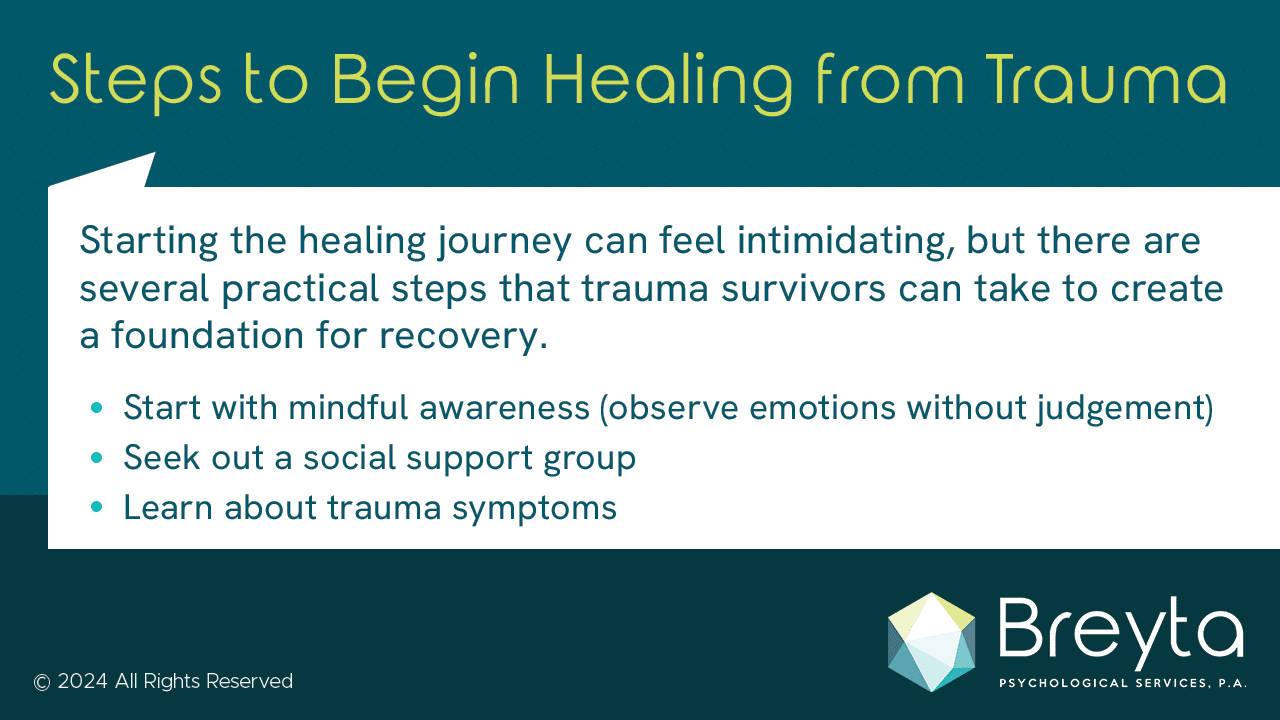Trauma impacts many aspects of our lives, shaping our self-perception, relationships, and worldview. Whether the traumatic event occurred recently or years ago, its effects can feel persistent and overwhelming, even manifesting as physical symptoms. However, healing from trauma is possible, and with the right guidance and support, individuals can find clarity and peace.
Dr. Vanessa H. Roddenberry, Ph.D., HSP-P, Executive Director of Breyta Psychological Services, shares insights on how trauma affects individuals over time and offers compassionate steps toward healing.
If you’re suffering from trauma or have symptoms of PTSD, we can help. Connect with Breyta Psychological Services today and start healing.
The Lasting Impact of Childhood and Adolescent Trauma
When trauma occurs in childhood or adolescence, it can leave a lasting imprint that shapes a person’s entire outlook on life. Dr. Roddenberry explains that early trauma “deeply changes the way that you view yourself, other people, and the world.” These formative years are crucial for developing core beliefs, so traumatic events during this period can influence how individuals see themselves and interact with others well into adulthood.
- Adaptive but Limiting Strategies: Many survivors develop coping mechanisms to navigate unsafe environments as children. As Dr. Roddenberry notes, “If you’re in a situation where you felt at risk, unsafe, or threatened, you may have figured out how to function within the parameters of that situation.” While these strategies were crucial for survival, they may turn into rigid beliefs that limit adult interactions and relationships.
- Entrenched Beliefs Over Time: Beliefs formed during childhood can become deeply ingrained. Although helpful in the past, these beliefs may later feel confusing or even counterproductive. “It might not fit every situation later in life, but it feels really difficult to let go of those beliefs because there was a time when it was so important to adhere by them,” Dr. Roddenberry explains.
Recognizing these patterns is often the first step toward change and freeing oneself from the grip of past trauma.
Challenges in Healing from Recent Trauma
A traumatic event that happened recently brings its own set of challenges, as the memories and emotions surrounding the event can feel fresh and raw. This is also the case with Post-Traumatic Stress Disorder (PTSD). However, addressing recent trauma can be incredibly beneficial for recovery, especially with timely support. According to Dr. Roddenberry, “Getting therapy for PTSD is really useful, even if you don’t think you have PTSD.” Addressing trauma soon after it occurs can sometimes prevent symptoms from escalating into more severe mental health issues, allowing individuals to process their experiences in real-time.
Many trauma survivors experience symptoms like hypervigilance, intrusive thoughts, and difficulty sleeping, which Dr. Roddenberry describes as the body’s natural response to feeling threatened. “Post-trauma, your alert and alarm system is set at a sensitive level that might not always match future situations,” she explains. In essence, the body’s threat detection system becomes overly sensitive, even in safe environments. Through trauma-focused therapy, survivors can work to recalibrate this system, helping them regain a sense of safety and normalcy.
Timely intervention can be particularly helpful for those dealing with a recent traumatic experience. “Therapy can help potentially stave off PTSD by providing you with the tools and support to process what you’ve experienced,” Dr. Roddenberry adds. Early treatment can make a lasting difference, empowering trauma survivors to regain control of their lives before distressing symptoms become deeply rooted.
Common Obstacles on the Healing Journey
The path to trauma recovery is rarely linear, especially with childhood trauma. Survivors often encounter several obstacles along the way. A significant barrier to healing is fear, particularly the fear of revisiting painful memories. “One of the biggest challenges that we see… is fear about the treatment itself,” Dr. Roddenberry explains. Many people worry that facing their trauma will be overwhelming or even make things worse. This fear can lead to avoidance, preventing individuals from seeking the help they need.
Avoidance is a common coping mechanism with psychological trauma, as Dr. Roddenberry highlights, but it can also prolong trauma symptoms by limiting opportunities for growth and healing. Avoiding triggers or reminders of trauma might offer temporary relief, but it often reinforces distress in the long run.
“You’re in a big club if you have that worry,” she says, reassuring that this fear is a normal part of the healing process. As Dr. Roddenberry notes, with compassionate support, individuals often discover they are more resilient than they initially thought: “Usually within a few sessions, we find people saying things like, ‘I actually wish I’d done this a long time ago.’”
At Breyta, therapists work alongside clients to approach trauma “in a really organized and intentional way.” This structured approach prevents individuals from feeling overwhelmed by emotional trauma, helping them gain control of the healing process and gradually face difficult emotions.
Practical Steps to Begin Healing from Trauma

Starting the healing journey can feel intimidating, but there are several practical steps that trauma survivors can take to create a foundation for recovery. Dr. Roddenberry suggests starting with mindful awareness, a process of observing emotions and behaviors without judgment. “Building awareness of the feelings related to that or the pattern itself… is really useful,” she explains. Recognizing emotional patterns allows survivors to practice self-care more intentionally, identifying moments when they need support or a break.
a social support group is another vital element of trauma recovery. Trauma can cause people to withdraw and isolate, often leading to a sense of disconnection and loneliness. However, even small efforts to reconnect can make a significant difference. Dr. Roddenberry encourages people to reach out in small, manageable ways: “Just reaching out to someone and saying, ‘What are you doing? How are you?’ can bring up a conversation and help you feel like you have these connections, you’re not alone.” This act of connection, however small, reminds trauma survivors of the support network that exists around them.
Another helpful step is learning about trauma symptoms. “Learning the signs of PTSD can be really helpful too,” says Dr. Roddenberry, as this awareness can help trauma survivors understand what they’re going through and recognize when it’s time to seek professional help. Educating oneself about trauma symptoms can remove some of the mystery and fear surrounding trauma responses, making the experience feel more manageable.
How Breyta’s Therapy Approach Supports Trauma Healing
Breyta Psychological Services offers psychological evaluations and a trauma-informed approach that centers on each individual’s unique experiences, perspectives, and needs. This approach acknowledges the profound impact trauma can have on a person’s worldview and self-concept. “We give you concrete skills and tools that you can use to build awareness about the thoughts that might be causing you problems and change your relationship to those thoughts,” Dr. Roddenberry explains.
- Focus on Practical Skills: Therapy at Breyta goes beyond traditional talk therapy by equipping clients with practical coping skills they can use daily. This approach empowers clients to manage their thoughts and emotions actively.
- Safe, Supportive Environment: Establishing a secure and respectful therapeutic space is essential for trauma recovery. Dr. Roddenberry emphasizes, “We work really diligently on ensuring that our clients feel safe, respected, heard.” This foundation allows clients to address difficult memories and emotions more comfortably.
Additionally, Breyta’s trauma-informed approach includes psychoeducation, helping clients understand how trauma affects both body and mind. “Trauma treatment helps recalibrate your threat assessment system and the way you think about yourself and others in a more functional way,” Dr. Roddenberry notes. By blending emotional support with practical tools, Breyta’s approach empowers clients to rebuild confidence and find resilience in their ability to cope with life’s challenges.
Healing with Trauma Therapy at Breyta
Healing from trauma is a journey that requires patience, compassion, and the right support. As Dr. Roddenberry’s insights reveal, therapy can provide invaluable guidance, equipping individuals with tools and skills to process past trauma and move forward with clarity and resilience. With Breyta’s trauma-informed approach, clients are empowered to reconnect with themselves, understand their trauma responses, and embrace a brighter, healthier future.
Trauma recovery is possible, and with consistent support and dedication, trauma survivors can learn to navigate life’s challenges with a renewed sense of strength and peace.
We can help you find your way forward. Start your journey with Breyta Psychological Services today.





